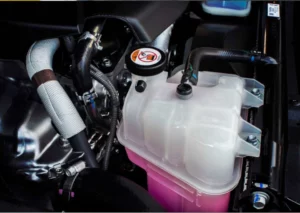Coolant: The Unsung Hero of Your Engine’s Health
 When you think about vital components under the hood of your vehicle, the engine, transmission, and brakes likely come to mind. However, there’s another unsung hero that plays a crucial role in keeping your engine running smoothly – coolant. Also known as antifreeze, coolant is a often-overlooked yet essential fluid that helps regulate your engine’s temperature, prevent overheating, and safeguard against freezing in cold weather. In this blog post, we’ll dive into the world of coolant, exploring its significance, how it works, the signs that your vehicle needs a coolant service, and why you should entrust this task to your local auto repair shop.
When you think about vital components under the hood of your vehicle, the engine, transmission, and brakes likely come to mind. However, there’s another unsung hero that plays a crucial role in keeping your engine running smoothly – coolant. Also known as antifreeze, coolant is a often-overlooked yet essential fluid that helps regulate your engine’s temperature, prevent overheating, and safeguard against freezing in cold weather. In this blog post, we’ll dive into the world of coolant, exploring its significance, how it works, the signs that your vehicle needs a coolant service, and why you should entrust this task to your local auto repair shop.
The Importance of Coolant
Coolant, typically a mixture of water and antifreeze, is responsible for maintaining the optimal temperature of your vehicle’s engine. It serves several crucial functions, including:
- Temperature Regulation
Coolant absorbs and carries heat away from the engine, preventing it from overheating during operation. - Freeze Protection
In cold weather, the antifreeze in coolant prevents the engine and radiator from freezing, which could cause significant damage. - Corrosion Prevention
Coolant contains additives that protect the engine and cooling system from rust and corrosion. - Lubrication
It provides lubrication for the water pump, ensuring it operates smoothly and efficiently. - Maintaining Efficiency
Proper coolant levels and quality help maintain the engine’s efficiency and longevity.
Signs Your Vehicle Needs Coolant Service
Recognizing when your vehicle requires a coolant service is crucial for preventing overheating and engine damage. Look out for these common signs:
- Temperature Gauge Fluctuations
If your engine’s temperature gauge frequently fluctuates between hot and cold, it may indicate a coolant issue. - Visible Leaks
Puddles or spots of bright-colored coolant (usually green, orange, or pink) under your vehicle are a clear sign of a coolant leak. - Low Coolant Warning Light
If your vehicle has a low coolant warning light, pay attention to it as it may indicate low coolant levels. - Overheating
Engine overheating is a severe sign of coolant trouble. If you notice steam or smoke coming from the engine bay, pull over immediately and seek assistance. - Sludge or Rust in the Coolant
Check the coolant reservoir for signs of sludge or rust, which can indicate contamination.
The Benefits of Professional Coolant Service
While some vehicle maintenance tasks can be performed by DIY enthusiasts, a coolant service is best left to the professionals. Here’s why you should entrust this task to your local auto repair shop:
- Expertise
Professional mechanics have the knowledge and experience to assess your vehicle’s coolant needs accurately. - Equipment
Auto repair shops are equipped with the necessary tools and equipment for a thorough coolant service. - Quality Products
They use high-quality coolant and antifreeze products that meet your vehicle’s specifications. - Thorough Inspection
Mechanics can perform a comprehensive inspection of the cooling system, identifying any potential issues. - Preventative Maintenance
Regular coolant service can catch minor problems before they become major and costly repairs.
Coolant may not be the star of the show, but it’s undoubtedly a critical player in your vehicle’s performance and longevity. Neglecting proper coolant maintenance can lead to engine overheating, which could result in costly repairs. By scheduling regular coolant services with your trusted auto repair shop, you’re not only ensuring your engine operates at the right temperature but also preventing damage caused by freezing in cold weather. Don’t wait until you see warning lights or experience overheating; take proactive steps to keep your engine’s cooling system in top shape, ensuring a reliable and long-lasting driving experience.











